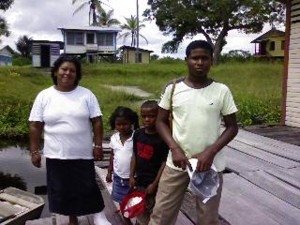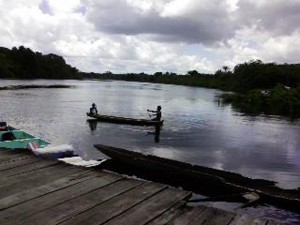Residents of several Berbice River communities say the lack of employment and educational opportunities is the impetus behind migration to New Amsterdam, Georgetown and overseas and if changes aren’t made soon the communities will soon be abandoned.

During a recent visit to several riverain communities, residents told Stabroek News that they were the only ones from their families in the area as their relatives had left. Olna Vanlewin a resident of Coomacka, Berbice River said she had been born in the area and liked living there. However, she said most of her relatives had moved to New Amsterdam and Georgetown and some had emigrated. The woman said in June she had been forced to leave her job of 14 years as a cleaner at the Tacama army base, after older family members had left the community and no one was there to care for her children. Vanlewin said she now planned to become a retailer to earn some income.
One pensioner told Stabroek News that, “plenty, plenty persons leaving the area” because no jobs were available. Kimbia Captain Frank Macedo echoed this, adding that persons were also moving to Aroaima and other places. As a means of providing employment in his community, Macedo wants a tractor and plough to increase farming in the savannahs, as well as a rice hauler, “because rice is getting costly. We got lands that will grow anything that will grow in Guyana,” he contended. However, Macedo said “cattle not doing so well,” as this once thriving cattle farming community now had under 100 cattle with some families owning six or seven animals. In the past Kimbia was known for its bountiful cattle and agriculture.

A 20-year-old woman, whose parents asked that she remain anonymous, told Stabroek News that since she left primary school a number of years ago, she had stayed home and was unable to find a job. The woman has no skill or trade as she has never left the area to attend secondary school or to pursue training since, according to her mother, she “could not afford it.” The young woman, the third of five siblings, said she was willing to work outside the community.
Earning a living from the main source of employment; farming, is also not easy. Sandhills Captain Andre Lindee noted that it was “very difficult” for farmers to earn an income. Lindee said over the past two to three years persons in his community had hardly cultivated their lands due to the increased cost of fertilizers and flooding. He said farmers had been experiencing “terrible” flooding as the level of the Berbice River had risen. He said too most persons at Sandhills were engaged in clay farming since farming in sandy soil required fertilizer. Lindee said about 100 acres or more was cultivated at Sandhills and that farmers had sought flood relief, though they were still waiting for a response.
The quest for a better education is also contributing to migration. Farmer Lennox Eastman who has nine children sends them to secondary schools in the city, though he admits it is very hard to maintain them.
The man said if he had an engine-powered boat he would have sent his children to the Kwakwani Secondary School, since it would have lessened transportation costs. Eastman said he rented an apartment in the city for his wife and children and he had found this arrangement to be cheaper than letting his children stay at relatives. The man said he had been born on the coast but had lived in the Berbice River community for 20-22 years. He said he’d like to see a high school built in the area.
Meanwhile, Region 10 Chairman Mortimer Mingo while on a visit to the area had said in order for a high school to be built a survey would have to be conducted to ensure that it was feasible. He said there were facilities at Kwakwani including a student hostel for students to attend secondary school. “We are going to work to improve the facilities… as far as possible,” he told residents at Wikki, Calcuni during a meeting there. Mingo also spoke of plans to extend the student hostel and secondary school in order to accommodate more pupils. “The other half lies with the parents,” he said, as they would need to ensure that their children attended school regularly in order to gain the marks for placement at the school.





